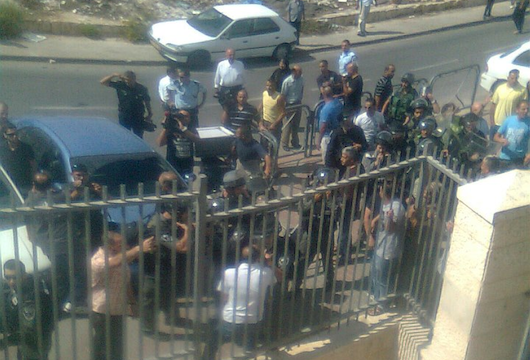Israel Police yesterday shut down a Palestinian school in East Jerusalem for a period of a week. The school has over 1,200 students between the ages of 12 and 18 years old. The police justified their actions to the students and teachers by voicing suspicion that stones were thrown at settlers by students from the school. +972 magazine learned from students and teachers that the school doesn’t allow students to throw stones from the school, but they cannot monitor students outside the school. It is unreasonable and unrealistic, a teacher said, “to be held responsible for individual students’ actions outside the parameters of the school.”

Earlier in the day, stones were thrown in the At-Tur neighborhood at settlers, and one of them was hit. The police arrived immediately to the scene and launched an attack at the school, suspecting that students were involved in the stone-throwing. Residents from the neighborhood and teachers clashed with the police and stopped them from storming the school and arresting students. According to eye witnesses, the police resorted to punishing the teachers by issuing traffic violations and parking tickets to them upon leaving the school.
+972 magazine talked with some of the parents who refused to identify themselves or their children because of fear of retaliation from the police. One of the parents described a phone call he received from his son: “I received a horrifying call from my son whose voice was shaking, he said he can’t leave the school and it is besieged by police. My son was terrified that he would be arrested or killed. He was begging me to get him out of school.”
Collective punishment against Palestinian communities and schools is not a new policy of the Israeli police. Throughout the First Intifada in the late 1980s, similar actions were taken to shut down universities and schools. However, this strategy never succeeded in stopping protests or stone-throwing during the First Intifada. The opposite process happened, with more people becoming active in protesting the occupation.
The police action raises another question regarding their response to stone-throwing at settlers. In an incident that I wrote about last month, a Palestinian beaten by Israeli Jews was barely given any attention by the police. The Palestinian community in Jerusalem is convinced that the Israeli police have double standards when it comes to dealing with violence. When a Palestinian throws a stone, it must be stopped at any price, but when a Jew does the same or worse, it is a minor incident that poses no danger.
This incident comes only few days after Palestinian Israelis commemorated the killing of 13 Palestinians citizens of Israel by police twelve years ago. Unfortunately, many Palestinians under Israel’s rule don’t believe that any lessons have been learned since then. Palestinians don’t believe the premise that the police is fair and doesn’t discriminate according to race or religion.
Closing the school for a week is an unjustifiable decision. First, such an action will not stop youth from throwing stones. On the contrary, they are now free with no school, homework, or activities to participate in. Throwing stones might become even more attractive to students who haven’t done so before. Additionally, attacking a school in this manner causes trauma to teenagers who may suffer from it for years to come. Such trauma could affects the decisions and actions of hundreds of young people. In conclusion, police behavior is counterproductive to their goal of putting an end to stone-throwing. Violence generates more violence and the Palestinian teenagers who encountered the police attack on their school are likely to remember this incident with bitterness and rage.
Lady Bird Johnson said that “children are likely to live up to what you believe of them.” If the police treats these children as terrorists or criminals, they could grow up as such. Schools should always be off-limits to police attacks, and collective punishment against children should never be tolerated.
Palestinian children in Jerusalem see growing number of extreme settlers moving into their neighborhood. They watch them take their land and enjoy superior rights and better infrastructure. These children are living the consequences of the occupation. They see injustice carried against their community on daily basis. Violence and collective punishment will not bring a resolution or peace. The solution is to end the occupation, not to terrify children.
As Nelson Mandela said, “We owe our children, the most vulnerable citizens in our society, a life free of violence and fear.” This is true for Palestinian children just as it is true for Israeli children. It is unacceptable that Palestinian parents have to send their children to schools not knowing if they will come home that afternoon or spend it in an Israeli jail. It is not acceptable that a mother has to convince a child to go to school every morning because he is afraid of the police, as is the case in many families. This is not a normal life, nor does it make Israelis safer when Palestinian children live in trauma and fear.
Perhaps my vision for the future is too naive, but I keep dreaming of a society that respects all humans regardless of race or religion. If that is too much then at least we must expect that children enjoy basic human rights and not be treated as criminals. Is too much to ask that Israeli police officer see a Palestinian 12-year-old child the same way he sees a Jewish one? Mother Teresa put it best when she said, “It’s the greatest poverty to decide that a child must die so that you may live as you wish.”
Related:
Chronic uncertainty: Trauma of childhood under occupation
Testimonies by Israeli soldiers detail abuse of Palestinian children
Report by British jurists reminds of the horrors of Israeli child detention

